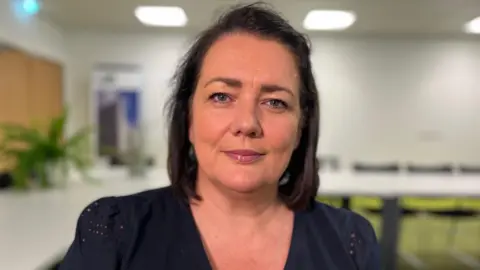[ad_1]
By Suzanne Allan, BBC Scotland News
 BBC
BBCDetectives have issued a warning to online sex offenders as the Scottish school holidays get under way.
With youngsters likely to spend more time at home and more time online, Police Scotland has revealed a rise in online sexual crime against children.
New figures from the force show reports of online child sexual abuse and exploitation in Scotland have increased by 21% in a year.
Between April last year and March a total of 2,055 cyber-enabled sexual crimes against children were recorded – 364 more than the previous year.
Det Ch Supt Sam Faulds, head of public protection, told BBC Scotland News that in the last few years she had seen a 300% increase in referrals about online child sexual abuse and exploitation.
She described the rise as “eyewatering”.
‘Victims every day’
Det Ch Supt Faulds said: “Children are becoming victims every single day in Scotland.
“It might be by someone based in Scotland or outside the UK. Those are victims or indirect victims, and it’s happening on a daily basis.”
She believes the rise is due partly to living more of our lives online.
“We’re coming up to the school holidays where again children will be online more often, more frequently – and so will the perpetrators looking to target children and young people, to manipulate them.
“Children are increasingly vulnerable because the online world is getting bigger, so the threat is getting bigger.
“I don’t think people understand how vulnerable they are online.”
 Getty
GettyThe senior officer warned sex offenders or those thinking about offending to consider the consequences of their actions.
Det Ch Supt Sam Faulds said: “This is about the individuals who present a risk to those children and young people.
“This is targeting offenders and people who might not have reached that stage yet but have sexualised thoughts about children, to encourage them to get help themselves and to stop themselves becoming offenders.
“It is not a victimless crime, it is not an invisible crime, there are children at the heart of this.”
Police Scotland’s new prevention campaign is also aimed at potential offenders and urges them to consider the impact a prosecution would have have on their own family.
The message, “Get help, or get caught”, offers them a way to stop before they offend, directing them to Stop It Now! Scotland, run by the Lucy Faithfull Foundation.
The charity offers advice and support on online behaviour to prevent offending.
The campaign will run for six weeks across the summer break on social media platforms including Instagram, YouTube, Facebook and X.
 Getty
GettyHigh profile online sexual abuse cases have been highlighted in recent months.
In March, serial predator, Benjamin Young, 42, was sentenced to 12 years in prison and given an Order of Lifelong Restriction (OLR).
The judge at his trial described Young’s crimes as “plumbing the very abyss of depravity”.
The High Court in Edinburgh heard he sexually abused 10 children as young as two and filmed and distributed footage of the attacks.
Young, 43, admitted 32 offences and was sentenced to a minimum of 12 years in prison.
Last month ex- footballer Ian Heddle admitted the serious sexual assault of a child and possession of thousands of indecent images of children.
Heddle, 61, from Dunfermline, was originally charged after more than 270,000 indecent photos and videos of children were found in his possession.
An investigation led to him being further charged with the sexual assault of a child, believed to be around eight, in Thailand.
Heddle pled guilty at the High Court in Glasgow and will be sentenced next month.
Det Ch Supt Faulds warned that perpetrators frequently use social media contact their victims through social media.
“Children don’t know who they’re engaging with, oh we’re really good friends, let’s exchange images and they don’t realise the consequences that the minute that image or that chat is out there, they have lost control of it.
“We want children to be educated about how to be safe online”.
She advises parents and guardians of young people to keep talking to them, ask what are they accessing, who are they engaging with and to try and check their devices.
[ad_2]
Source link




